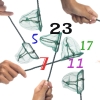| Featured on Plus |
|
It's nearly Christmas! Count down the days with the Plus advent calendar. There's a mathsy goody from the archive waiting behind each door!
|
| Merry Christmas from the Plus team! |
|
|
|
|
|
 MysteryTwisterC3 is an international cryptography challenge. It's got all sorts of codes for you to crack, from easier ones that only require pen and paper, all the way up to as yet unsolved ciphers. You can submit your answers online and if you've cracked your code you'll be entered in the global hall of fame. So sharpen your brain and get cracking! MysteryTwisterC3 is an international cryptography challenge. It's got all sorts of codes for you to crack, from easier ones that only require pen and paper, all the way up to as yet unsolved ciphers. You can submit your answers online and if you've cracked your code you'll be entered in the global hall of fame. So sharpen your brain and get cracking!
|
|
Maths in a minute - prime pleasures
 Mathematicians love prime numbers, but why? Firstly, it's because they are like the atoms of number theory. They're divisible by nothing expect for 1 and themselves. Any other whole number bigger than 1 can be written as a product of primes in a unique way. For example, 6=2x3 and 18=2x3x3. That result is known as the fundamental theorem of arithmetic. It means that if you want to prove something about all whole numbers, it's often enough to prove it for the primes, as any number can decomposed into its prime factors. Mathematicians love prime numbers, but why? Firstly, it's because they are like the atoms of number theory. They're divisible by nothing expect for 1 and themselves. Any other whole number bigger than 1 can be written as a product of primes in a unique way. For example, 6=2x3 and 18=2x3x3. That result is known as the fundamental theorem of arithmetic. It means that if you want to prove something about all whole numbers, it's often enough to prove it for the primes, as any number can decomposed into its prime factors.
But mathematicians also love primes because they are mysterious. The ancient Greek mathematician Euclid proved that there are infinitely many primes. His proof is simple: suppose that there are only finitely many primes, p1, p2, p3, etc, up to some prime pn. Let q=p1 x p2 x p3 x ...pn +1. So you q is the product of all the primes plus 1. It can't be prime itself because it's bigger than all the primes on the list. This means that q itself is divisible by some prime because of the fundamental theorem of arithmetic. But it's quite easy to show that none of the primes on our list can divide q, because if one did then it would also have to divide 1 and that's impossible. Hence there must be another prime beyond the primes on our list. That's a contradiction because we've assumed that all primes are on our list. Hence our initial assumption is wrong and there must be infinitely many primes.
So we know that there are infinitely many primes, but how are they distributed among the other numbers? If you've got one prime, how long do you have to count up until you meet the next? One thing you notice when you look at primes is that they sometimes come in pairs that have a difference of 2, for example 3 and 5, 5 and 7, 11 and 13, 17 and 19, etc. Are there infinitely many such pairs? This seemingly simple question is still unsolved. It's known as the Twin Prime conjecture.
One thing we do know is the asymptotic distribution of the primes. For any positive number x, write P(x) for the number of primes less than or equal to x. Then (loosely speaking) as x gets bigger and bigger, P(x) gets closer and closer to x/ln(x).
However, the exact distribution of the primes is still a mystery. It's the subject of one of the hardest open questions in maths, the Riemann hypothesis.
There are other seemingly easy questions about primes that are still unanswered. An example is the Goldbach conjecture, which says that every even integer greater than 2 is the sum of two primes.
So that's why mathematicians love primes. They are fundamental, yet mysterious. In recent years they have become popular with more practically-minded people too because they provide the codes that encrypt sensitive information sent over the internet.
You can find out more about primes on Plus:
The prime number lottery
The music of the primes
Mathematical mysteries: the Goldbach conjecture
Mind the gap
Elusive twins
All Plus content on primes
If you have any comments on this newsletter, or Plus Magazine, please contact us at [log in to unmask] - we are always happy to hear from our readers!
Feel free to forward this email to anyone you think might be interested.
Happy reading and happy Christmas!
|
